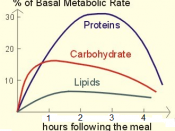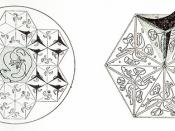Metabolism is the countless series of chemical reactions that take place continuously within an organism, allowing it to live. It includes all physical and chemical processes within the body such as digestion, food absorption, waste elimination, respiration, circulation, and temperature control. In simple terms, your metabolism is the rate at which your body operates to carry out all its bodily functions, like the production of heat, RNA, hair, bones, etc. and the breaking down of food and storage fat. Metabolism can be grouped into two main processes called anabolism (constructive metabolism) and catabolism (destructive metabolism). Anabolism is the building of complex molecules from smaller ones and is needed for the development and maintenance of new cells, while catabolism on the other hand, refers to the production of energy required for all external and internal activity. It is also responsible for the regulation of body temperature and the breaking down of complex substances into smaller and simpler ones for recycling or release.
Both of these processes occur simultaneously since all reactions are powered from destructive metabolism. The "fuel" that provides the energy needed for all metabolic reactions is found in food.
Currently, sporting nutrition has now focused on anti-catabolic methods. When the rate of catabolism is decreased, it causes the rate of anabolism to increase, resulting in faster recovery, a higher level of performance, and an improved growth rate.
Our body needs a great variety of nutrients to function properly. A shortage of even one vitamin can slow down your metabolism.
The body's metabolism is governed by hormones (chemical messages secreted by the glands of the endocrine system) and the nervous system. The rates of catabolism and anabolism are carefully monitored to make sure they remain in balance. Metabolism can be upset by a variety of events, including genetic disorders and...


